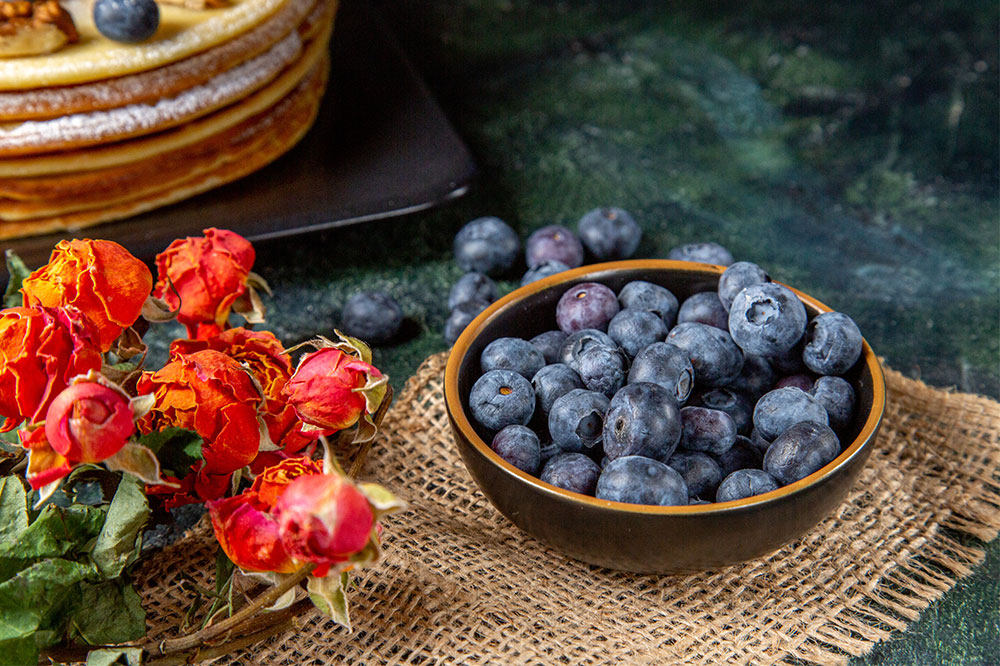10 Foods for Managing Chronic Kidney Disease

Chronic kidney disease, or chronic renal disease, is when the kidneys gradually lose their function. Since the kidneys’ primary function is to filter out wastes from the blood, their deteriorating function can lead to metabolic wastes building up in the body, making the person unwell. Therefore, the basic idea of a kidney-friendly meal is to limit the consumption of food rich in sodium, potassium, calcium, and phosphorous. So let’s learn about what foods are ideal.
Foods to eat:
Blueberries
Blueberries are known as a “superfood” for a good reason, as antioxidants are abundant in this berry. They are also a low-calorie fiber and vitamin C source and contain only low potassium levels. Hence, these are good for kidney patients. Alternatively, raspberries, strawberries, and cranberries are other fruits equally suitable for those with stable renal conditions.
Olive Oil
The best supplement to any meal plan imaginable is olive oil. Its low sodium, potassium, and phosphorus concentrations make it highly edible for people with renal issues. Its high concentration of beneficial monounsaturated fats makes it the ideal cooking oil for kidney patients and healthy individuals. Extra virgin or virgin olive oils should be purchased as they contain more antioxidants. For example, one may use olive oil in cooking, salad dressings, bread dipping, and vegetable marinades.
Cauliflower
For patients with kidney disease, cauliflower can be substituted for potatoes as it is low in potassium. It also has a lot of anti-inflammatory substances like indoles and is an excellent source of fiber, which guards against kidney-related illnesses and regulates uric acid levels. Indoles, glycosylates, and thiocyanates are also abundant in them; these molecules aid the liver in removing toxins that could harm DNA and cell membranes. For example, cauliflower can be consumed raw, cooked, boiled, blanched, in salads, as a dip, or raw.
Egg and meat
Egg whites are a high-quality, kidney-friendly source of protein. Since they are low in phosphorus and contain all the essential amino acids, they also benefit dialysis patients who require large amounts of protein. For example, choose lean red meat cuts like loin or round, or a fish like salmon, which is high in omega-3 fatty acids, if you prefer to get your protein from meat. Nonetheless, people with kidney problems should consume all these in moderation.
Garlic
You might think transitioning to a kidney-friendly meal plan is tedious if your body is used to consuming foods laden with chemicals like salt, but it doesn’t have to be. Adding garlic to your cuisine is a fantastic way to enhance the flavor. Moreover, it reduces cholesterol, calms inflammation, and helps in the fight against plaque. Just be sure to avoid using garlic salt.
Red bell peppers
Red bell peppers are a versatile meal plan choice for people with kidney illnesses because they are low in potassium and high in flavor. They are also a fantastic source of fiber, vitamin B6, folic acid, vitamin C, and vitamin A. They can be roasted and added to your favorite salad or sandwich, eaten raw with a dip as a snack, or chopped and sautéed into a stir fry. There are countless alternatives. Lycopene, an antioxidant found in red bell peppers, also protects against several malignancies. It can be eaten fresh or added to chicken or tuna salad.
Onion
After having onion, the breath may not smell good, but they are suitable for your kidneys. They are low in potassium. They contain quercetin and flavonoids, which prevent fatty substances from accumulating in the blood vessels. Taking quercetin-containing food can also reduce your risk of acquiring cancer and heart disease. Onion is also a good source of chromium, which facilitates the metabolism of fats, proteins, and carbohydrates. Onions are ideal for renal patients looking for a sodium-free flavor and sufficient protein intake. In addition to having a delicious taste, onions are rich in vitamins B and C, manganese, zinc, and iron.
Raspberries
Ellagic acid, a phytonutrient found in raspberries, aids in the body’s ability to combat free radicals and halt cell damage. Moreover, they contain flavonoids known as anthocyanin, a potent antioxidant. Raspberries, which are rich in manganese, vitamin C, fiber, and vitamin B, may have properties that inhibit the growth of tumors and cancer cells. Raspberries can be combined into vinaigrette dressing, added to cereal, or pureed and sweetened to make a dessert sauce. Moreover, raspberry punch is an option.
Red Grapes
Red grapes are excellent fruits that are good for your kidneys and packed with nutrients. By preventing oxidation and lowering the production of blood clots, the flavonoids included in red grapes aid in preventing heart disease and safeguarding the kidneys. The flavonoid resveratrol found in grapes, may also promote the generation of nitric oxide, which aids in relaxing blood vessel muscle cells to improve blood flow. Thus, eat enough red grapes to improve the health of your kidneys. Get red or purple-skinned grapes because they contain more anthocyanins. For individuals on a fluid restriction due to the dialysis meal plan, freeze the grapes to eat as a snack.
Watermelon
A potent antioxidant called lycopene is abundant in watermelons. It assists in scavenging harmful free oxygen radicals, reducing kidney damage. Watermelon is 92% water, which can help keep the body hydrated. Adequate hydration is essential for maintaining kidney health and preventing kidney stones; however, avoid consuming excessive amounts of watermelon, which can have adverse effects.
Conclusion
The ability of the kidneys to function correctly is greatly influenced by the foods and beverages you choose to consume. For example, a wide range of fruits, vegetables, cereals, and fatty fish are among the foods that benefit the organ’s health. Moreover, it is also advisable to stay hydrated as water keeps you full and helps your kidneys function properly.







